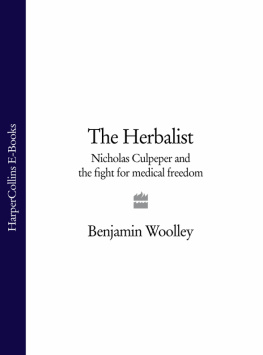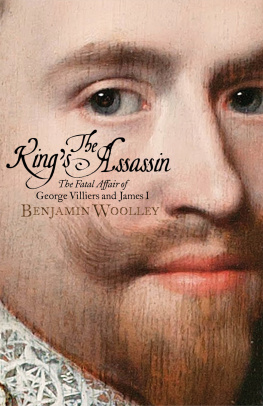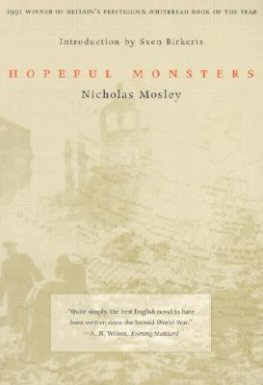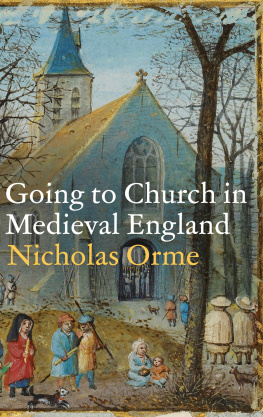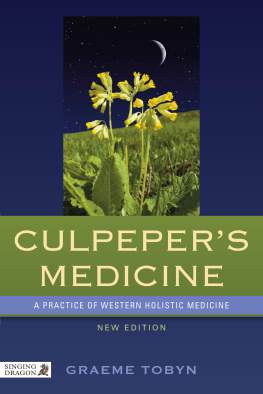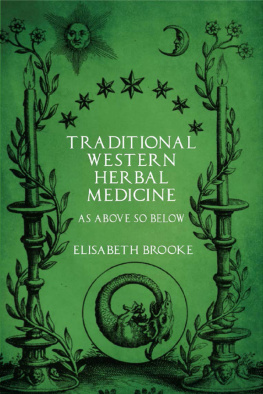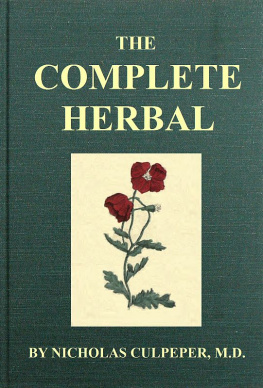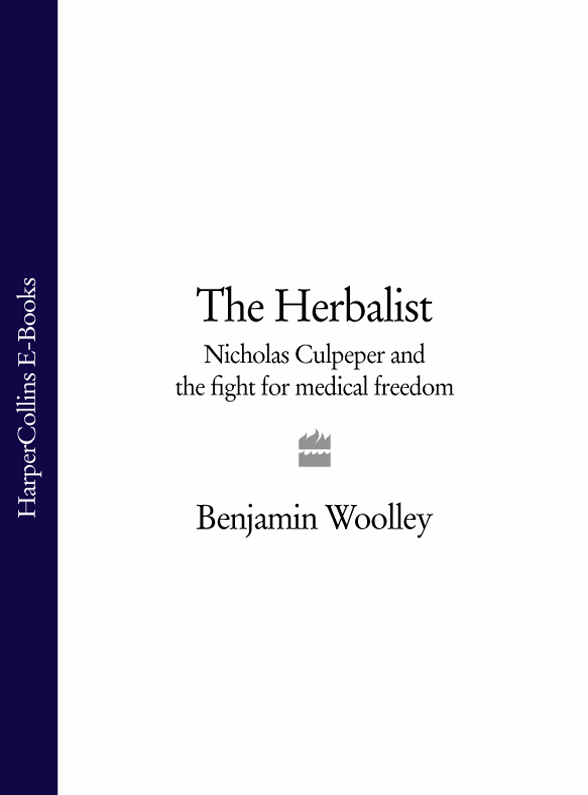
In memory of Joy Woolley,
19212003
In the landscape of history, Nicholas Culpeper has not always been welcome. If monarchs, ministers, political notables and scientific luminaries are stately oaks or cultivated blooms, Culpeper is the Cleavers (or Goosegrass, or Barweed, or Hedgeheriff, or Hayruff, or Mutton Chops, or Robin-Run-in-the-Grass, to use any of its multitude of names), a common grass that is so troublesome an Inhabitant in Gardens, creeping into the herbaceous borders and snagging clothes. As a result, he has been weeded out of the historical record, and barely a trace of him is left. The only documentation relating to him that survives is a brief memoir, one letter, a couple of manuscript fragments, several tantalising mentions in official papers, and some pamphlets. His own voluminous writings brim with character, but are almost empty of biographical details. Official medical and botanical histories written while he lived and since have contributed nothing, and in some cases have taken a great deal away. For this reason, Nicholass presence in history, and in the account that follows, is necessarily fleeting.
However, hidden in the undergrowth is a startling story, entangled with so many others, with the struggles of the woodturner Nehemiah Wallington to survive the plague, with the mischievous prophesies of the astrologer William Lilly, with the Olympian struggles and self-belief of King Charles I, and most of all with the anatomical explorations and loyal ministrations of the Kings doctor William Harvey, the Isaac Newton of medical science and model of medical professionalism. Like the Cleavers and other discarded weeds championed in his Herbal, Nicholas certainly had some Vices [but] also many Virtues. His vices were well known, itemised by friends as well as his many enemies: smoking, drinking, consumption of the purse. But he was also audacious and adventurous. He championed the poor and sick at a time when they were more vulnerable than ever. He took on an establishment fighting for survival and ferociously intent on preserving its privileges.
The heirs of that same establishment are inevitably the custodians of much of the material upon which this book relies, in particular the Royal College of Physicians, which provided generous access to its archives. Acknowledgement must also go to the Society of Apothecaries, the British Library, the Bodleian Library at Oxford, the Cambridge University Library, the Records Offices of the counties of East and West Sussex, Kent, Surrey, and of London, primarily the Guildhall Library, the Corporation of London and the Metropolitan Archives. Individual thanks are due to Briony Thomas and the Revd Roger Dalling for local information on Nicholass childhood, to Dr Jonathan Wright for reading the manuscript and Dr Adrian Mathie for checking some of the medical information.
The dates given are new style unless otherwise stated. Spelling and punctuation have been modernised where appropriate. Notes at the back provide details on sources, clarifications and definitions of some of the medical and astrological terminology, and brief discussions of the historical evidence. One final note: the capitalised City refers to the square mile that is the formally recognised city of London, a distinct political as well as urban entity with its own government and privileges, lying within the bounds of the ancient city walls. London or the city refers to the wider metropolitan area, embracing the city of Westminster to the west, Southwark on the south bank of the Thames, and the sprawling suburbs to the north and east.

Dame Venus was minded to pleasure Women with Child by this Herb, for there grows not an Herb fitter for their uses than this is, it is just as though it were cut out for the purpose. The Herb bruised and applied to the Navel stays miscarriage, I know no Herb like it for that use. Boiled in ordinary Beer, and the Decoction drunk, doth the like, and if her Womb be not as she would have, this Decoction will make it as she would have it, or at least as she should have it.
Let those Women that desire Children love this Herb, tis their best Companion, their Husband excepted.
The Herb fried with Eggs (as is accustomed in the Spring time) which is called a Tansy, helpeth to digest, and carry downward those bad Humours that trouble the Stomach: The Seed is very profitably given to Children for the Worms, and the Juice in Drink is as effectual. Being boiled in Oil it is good for the sinews shrunk by Cramps, or pained with cold, if thereto applied.
Also it consumes the Phlegmatic Humours, the cold and moist constitution of Winter most usually infects the Body of Man with, and that was the first reason of eating Tansies in the Spring. At last the world being overrun with Popery, a Monster called Superstition perks up his head and now forsooth Tansies must be eaten only on Palm and Easter Sundays, and their neighbour days; [the] Superstition of the time was found out, but the Virtue of the Herb hidden, and now tis almost, if not altogether, left off.
Tansy has a tall, leafy stem, two or three feet high, with ferny foliage and flowers like golden buttons. Maud Grieve describes it as having a very curious and not altogether disagreeable odour, somewhat like camphor. The name probably comes from the Greek Athanaton, meaning immortal, either because it flowers for so long, or because of its use in ancient times to preserve corpses. It was said to have been given to Ganymede (the most beautiful of mortals, carried off by Zeus to Olympus to serve as cupbearer and catamite) to make him immortal.
The herb was long associated not only with immortality but birth, hence the link with Easter, when, according to Grieve, even archbishops and bishops played handball with men of their congregation, and a Tansy cake was the reward of the victors. Richard Mabey, echoing Culpeper, writes that its original medicinal use at Easter time was to counteract the phlegm and worms arising from the heavy consumption of seafood during Lent.
Though tansy has a strong, bitter taste, the cake was sweet. According to a traditional recipe, it was made by adding to seven beaten eggs a pint of cream, the juice of spinach and of a small quantity of tansy pounded in a mortar, a quarter of a pound of Naples biscuit (sponge fingers similar to macaroons, but made with ground pine nut kernels rather than almonds), sugar to taste, a glass of white wine, and nutmeg. The ingredients were combined, thickened in a saucepan over a gentle heat, poured into a lined cake tin, and baked.
A dark, gnarled yew stood next to the lych-gate, poisoning with a drizzle of noxious needles anything that grew beneath it. Rose bushes still in flower were scattered across the graveyard, planted, according to local tradition, by the betrothed on the graves of their dead lovers. A mound of fresh earth marked the spot where, a few days earlier, Maurice Sackville, the late rector of Ockley, had been interred. This was the scene beheld on 15 September 1615 by the Revd Nicholas Culpeper, Sackvilles hastily-appointed successor. He had arrived just four days after Sackvilles funeral from his old post as vicar of nearby Alciston. He was in his mid-thirties and, for a country parson, uncommonly well educated, boasting a degree from the University of Cambridge.
Next page
